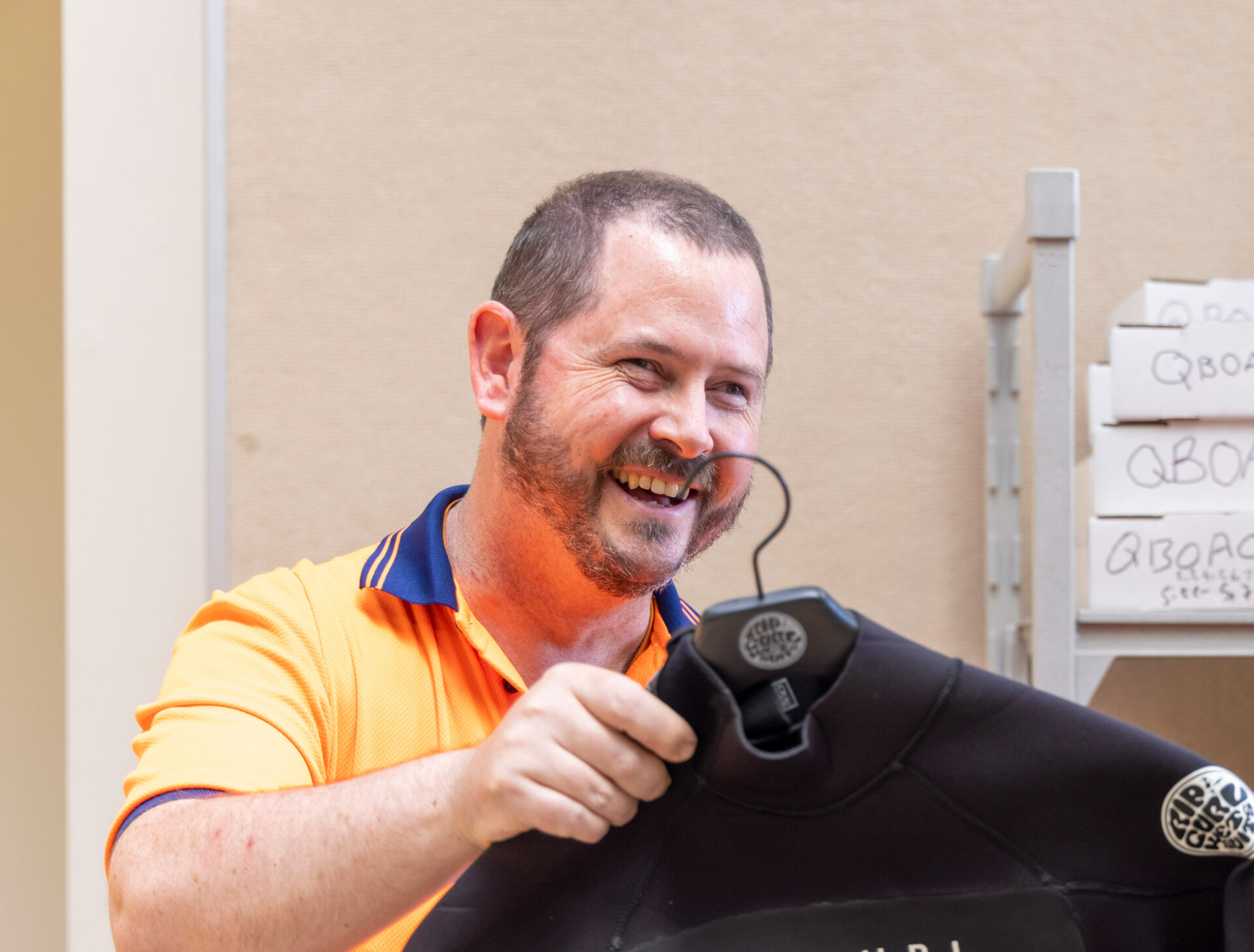Helping build confidence and careers
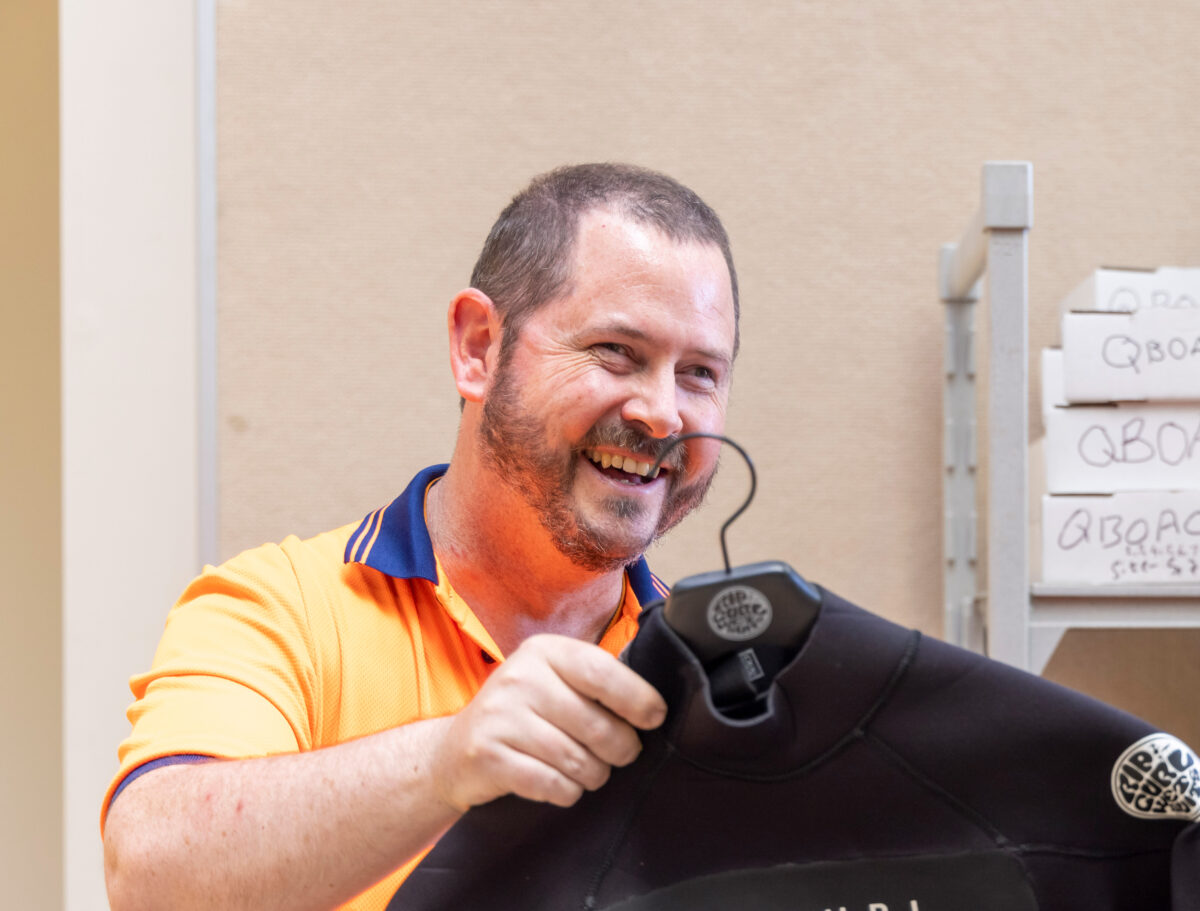
When Andrew joined genU as a supported employee in 2009, the Geelong resident with Aspergers was grieving the loss of his father and becoming increasingly withdrawn.
“It was extremely difficult to get him out,” said his mum, Ineke.
“Once he left school, he worked as a carer, but then he became highly anxious about driving so couldn’t do that work any longer.”
Fast forward to today and Ineke said Andrew has “blossomed” in a supportive work environment where his strengths were recognised. Andrew agrees.
“The first day… I was pretty much a person who arrived and wouldn’t have approached people or chatted to them, whereas now, I have turned for the better,” he said. “It feels like a place that I’m supposed to be part of – a second home.”
Andrew is one of the 4.4+ million Australians who have some form of disability. That’s 1 in 5 people. Yet, when it comes to employment, many people with disability find it challenging to access opportunities to reach their full potential.
genU has long recognised the talents and abilities of people with disability. A core part of our purpose is to broaden the representation and development of people with disability in the workforce. One of the ways we’re doing this is through supported employment at genU Business Enterprises.
Supported employment is a job where people with disability receive additional support while they are at work. Supported employees often receive training and assistance to do their job. In a safe and accommodating environment, they learn and develop new skills and work towards job goals set in their NDIS plans.
Like most workplaces, supported employment is a great place to earn money, build confidence and skills, and be part of the community. More than 220 people are employed with genU in supported employment roles across Geelong, Colac and the Mornington Peninsula. With service delivery expanding, a further 40 opportunities will become available in 2023.
“This is a great example of our commitment to creating and delivering services and support that empower people with a disability to reach their full potential,” genU CEO, Clare Amies said.
“We’re committed to growing our supported employment opportunities, including our new partnership with Ford Australia which will see our food service operations expand to Melbourne’s northern suburbs.”
100 per cent of supported employees felt they had developed new skills while working at genU Business Enterprises.
99 per cent of supported employees said working at Business Enterprises helped them reach their work goals.
Stats that may surprise you
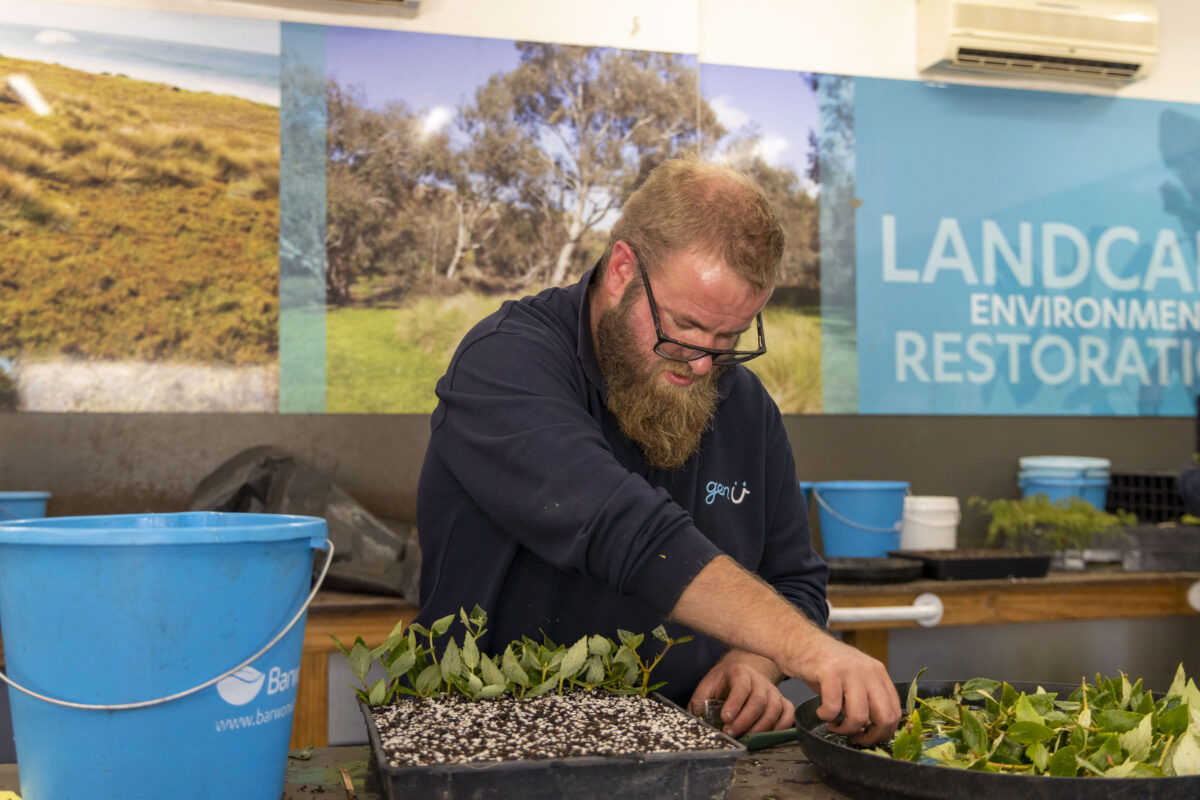


We already know that 20 per cent of the population live with disability. Yet, understanding of the different types of disability is low in the community and in workplaces.
People who use wheelchairs, or people who are deaf or blind are common perceptions. Yet only 4.4 per cent of Australians with disability use a wheelchair; around 17 per cent are affected by hearing loss; and an estimated 8 per cent are blind or have low vision.
In reality, there are many types of disability that fall under the following four broad categories – intellectual, physical, sensory and mental illness. And the causes can vary from an accident and trauma to genetics or disease. Moreover, a disability can also be:
• temporary or permanent
• total or partial
• lifelong or acquired
• visible or invisible
Over three-quarters of people with disability reported a physical disorder such as arthritis or back problems as their main condition. And with 45 per cent of Australians to experience a mental health condition during their lifetime , the relevance of disability inclusion in workplaces and communities is high.
The employment landscape for people with disability
The most significant challenge or barrier people with disability experienced in searching for, gaining and maintaining employment was a low level disability awareness from potential employers.
Of Australia’s 2.1 million people of working age with disability, less than half are employed (47.8%) compared with 80.3% of people without disability. Yet, many people with disability have strengths, skills and capabilities to offer employers.
Changing these statistics means supporting employers to build their knowledge and confidence to employ people with disability.
• Disability awareness training can highlight unconscious bias and help employers identify processes that need changing to tackle this common issue.
• Understanding employees needs’ and available financial assistance available is another key action employers can take to build an inclusive workforce.
• Accessing information about ways to customise roles to the strengths, abilities and interests of the person with disability can also open-up more employment opportunities for people with disability.
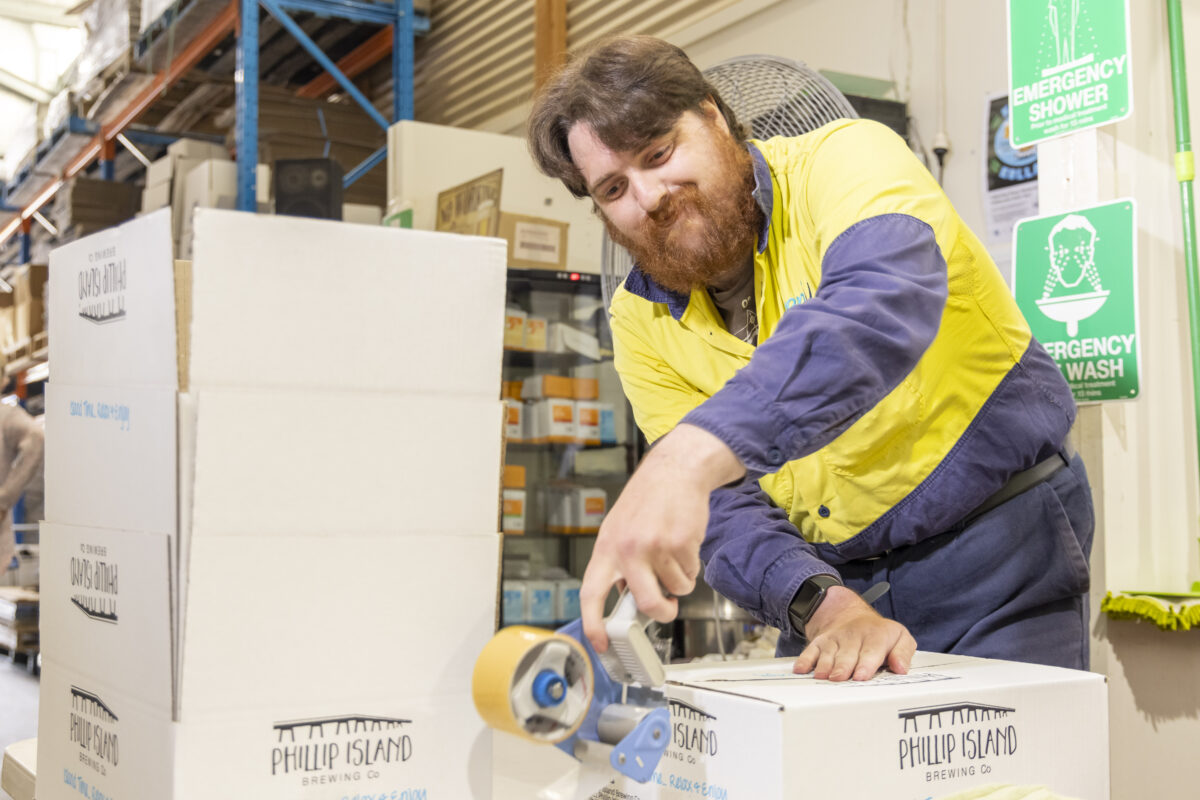


“Employers need support to create productive and inclusive workplaces where employees with disability can learn new skills in a safe and friendly environment and are valued members of a team,” Jaime-lee Demmer, genU Pathways General Manager said.
“This is where genU can step-in to provide tailored advice including accessing financial support to foster a culture where employees can flourish.”
Why do people with disability choose supported employment?
Supported employment provides all the benefits of open employment (mainstream employment in the labour market). It enables people to:
• Earn money
• Gain experience and new skills
• Build confidence
• Develop social networks
• Set goals and ways to achieve them
It’s meaningful work that fosters better wellbeing; an opportunity to earn and learn in a safe, supportive environment where people with disability are understood, valued, and set-up to succeed.
Supported employees can access training, mentoring, practical assistance including workplace modifications and preparation for change, emotional support as well as guidance for NDIS funding, services and referrals. Employees can also be coached to progress towards external work environments including open employment or a mix of both open and supported work.
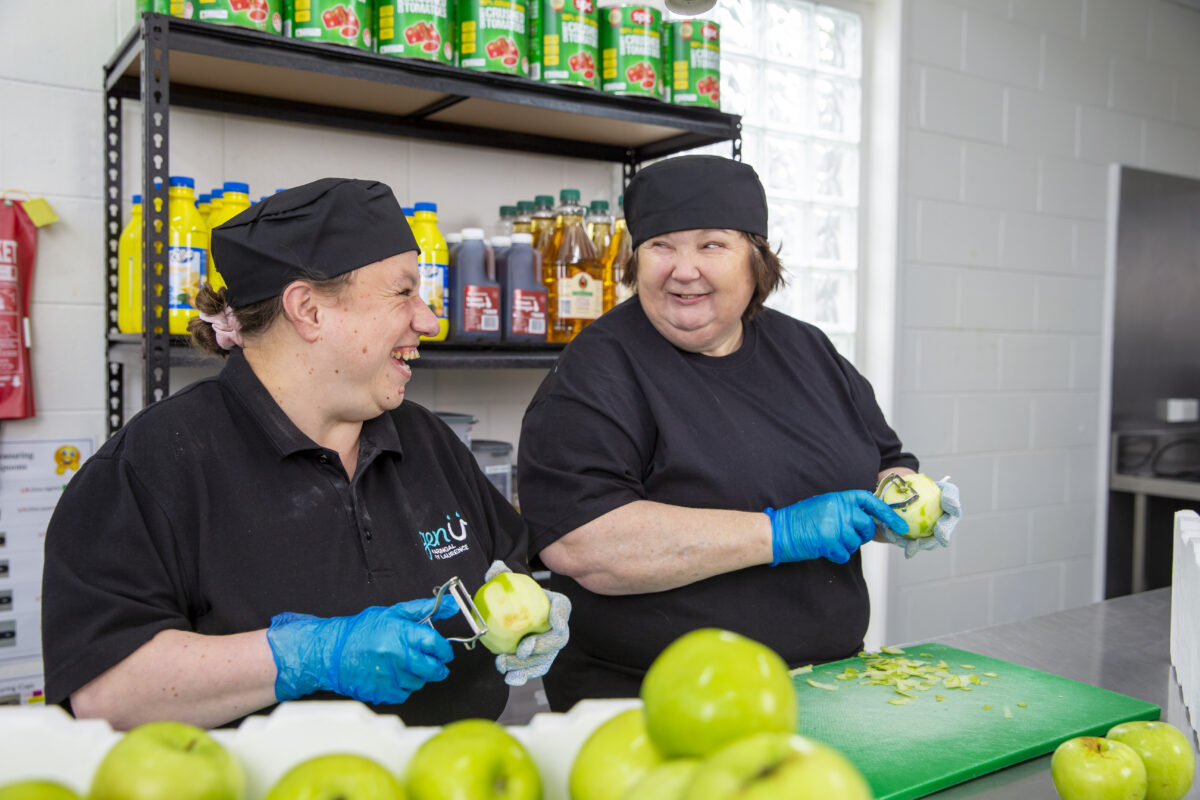


“I got paid for the first time in 20 years! It was fantastic and very rewarding.”
Kerrie, supported employee at Rosebud Seasons Kitchen who is legally blind.
100 per cent of supported employees said genU staff treated them with respect.
99 per cent of supported employees said they felt their voice was valued.
Supported employment at genU
A genU inclusive workplace survey showed all staff agreed or strongly agreed that Business Enterprises had a culture of challenging social stigma and supported the mental health and wellbeing or participants through inclusive practices.
Providing supported employment opportunities to people with disability is one of the many ways genU strives to build inclusive communities.
genU Business Enterprises offers a diverse range of supported employment opportunities for people with disability, including:
• Hospitality, catering and food preparation
• Landscaping and grounds maintenance
• Nursery and horticulture
• Packaging and warehousing
• Document shredding and management
• Commercial laundry.
“Their work has meaning and impact and supports organisations and business of every size, including global brands Rip Curl, Ford and Carbon Revolution,” Lachlan Hodgson, genU Business Enterprises General Manager said.
“Some employees need workplace modifications to assist them in their work. Others need extra support to try and learn new skills. Regardless of what’s needed, our workplaces have been designed to create a positive team experience where employees are set up and trained to succeed.”
100% of supported employees said their supervisor supported them in the workplace.
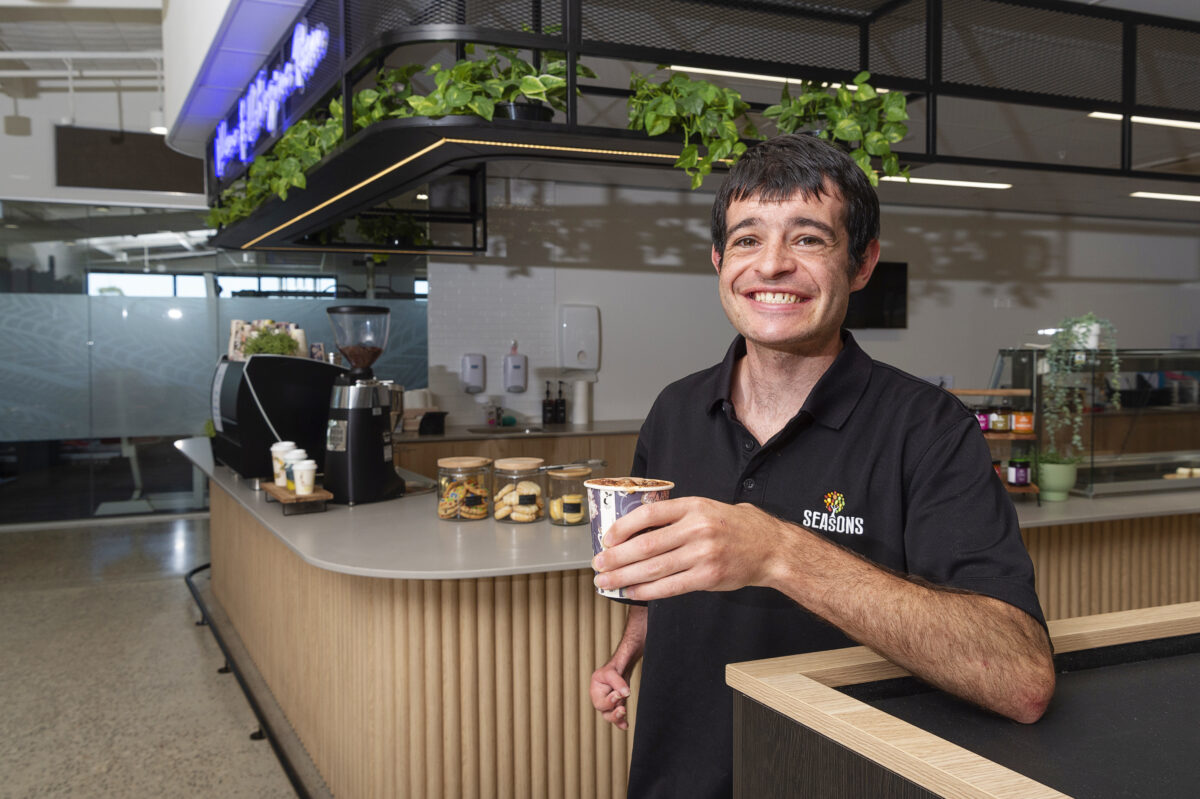


These opportunities create real value in the lives of people with moderate to severe disability. Like Aaron, who has been employed by genU Business Enterprises for more than seven years. The Barista and Café All Rounder currently works in the genU Support Hub Season’s café and is renowned for his exceptional upselling skills.
“The best part of my job is making the coffees and upselling the muffins!” Aaron said. “I get to be more social and have learned to cook new things. It’s built my confidence and I’m always happy. It makes me smile.”
100 per cent of supported employees said they felt part of a team.
A pathway to open employment
“Stepping back into mainstream employment last year was exciting. Every day is different and being able to get out on my own is awesome.”
Ashley, Delivery driver and former supported employee.
Supported employment is an important step in gaining experience in a workplace. For some, it’s also an important part of becoming ready for open employment opportunities. It’s a rewarding pathway for people to discover their interests, and have their strengths matched to roles that build their confidence and capacity to achieve goals in their NDIS employment plan.
“Employers are often not aware that job roles can be customised or carved out to suit both the strengths, skills, abilities, and interests of a person with disability while also often addressing unmet needs within their business,” Jaime-lee Demmer, genU General Manager said.
“genU has developed a range of strategies to enable employers to hire, support and retain people with disability as employees. Our model uses an approach that is bespoke to the employee with disability an emphasis on job carving as the approach to paid employment. We work alongside businesses, providing practical tools, resources and supports.”
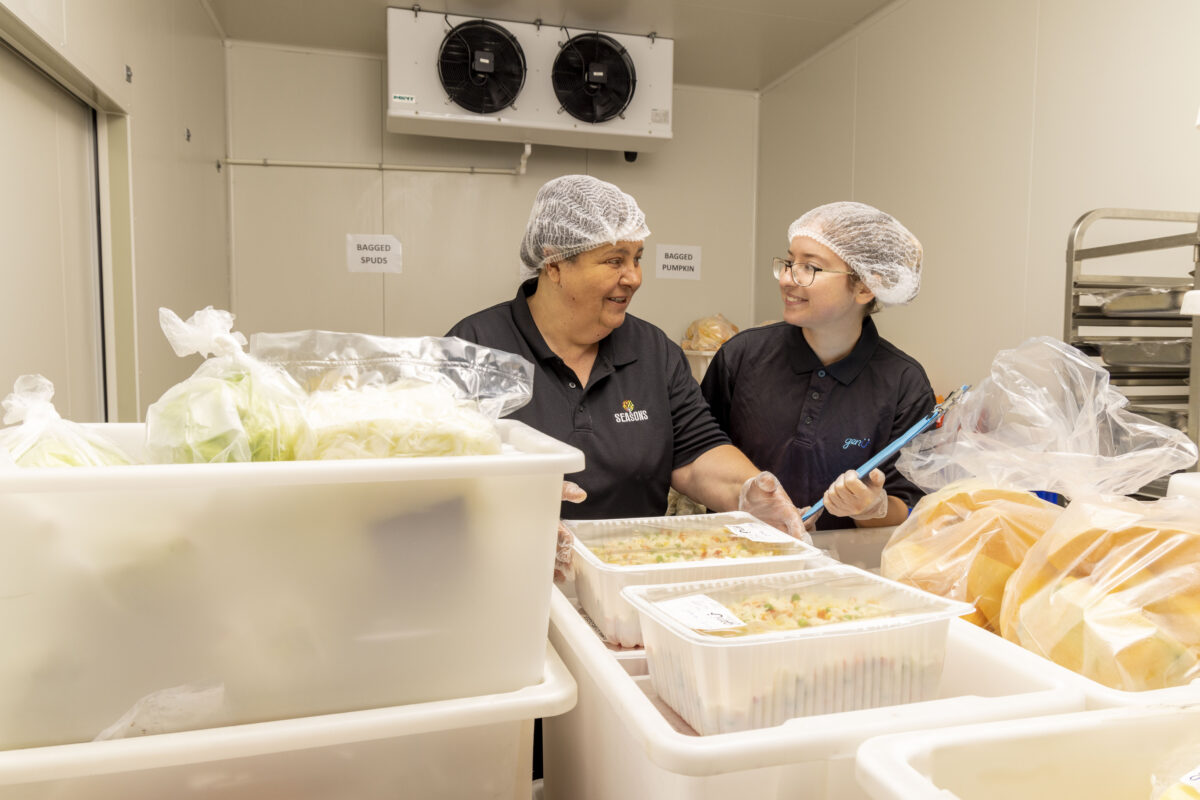


A supported employee in food preparation explains a job “carved-out” to match their strengths:
“What I like to do is get the pumpkins, wipe them, put them in their guillotine, chop them into four bits, and then unseed them all and then get it ready for everybody else to do…So it’s really good. It’s good teamwork.” Anonymous, supported employee from genU Food Services.
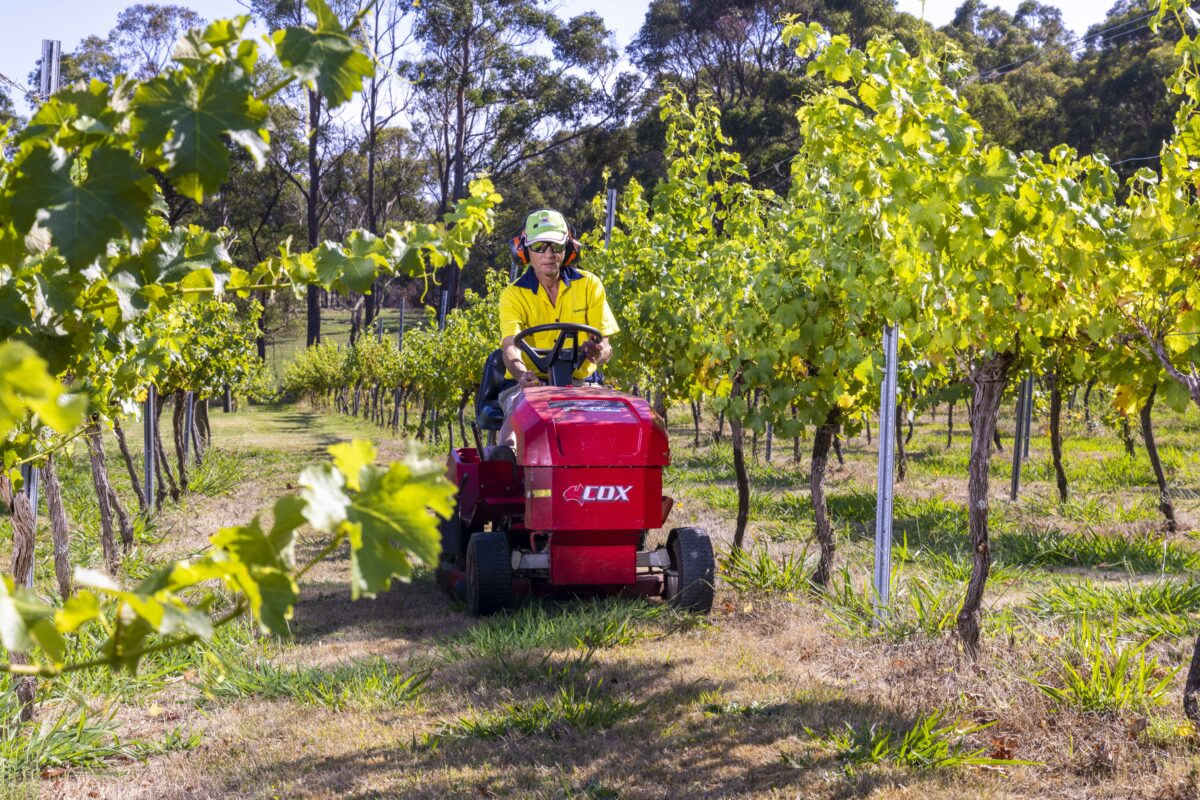


Job carving is possible across a range of industries including Landcare where jobs can be carved into watering or pruning trees or mowing. These jobs do not vary or change too often which means people can be trained over time. Employees can also progress to other carved jobs at their own pace.
Is supported employment at genU right for you?
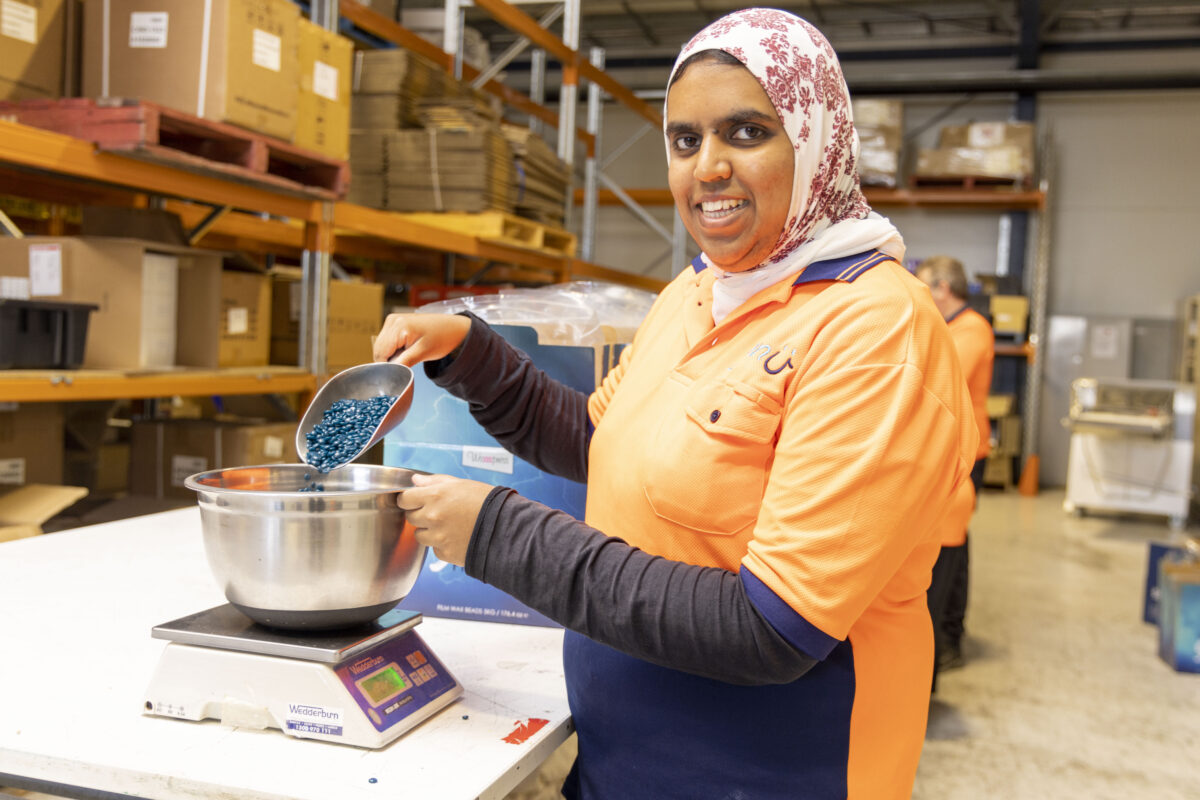


genU has had great success building the confidence and capability of people with disability via Supported employment. It’s meaningful work in a safe and supportive environment where people with disability are recognised for their strengths and abilities. It’s also an opportunity for supported employees to learn and earn in a workplace that sets them up to succeed.
If you’re 18 years old or over and have employment supports as part of your NDIS funding, supported employment at genU is a great way to get into the workforce. Talk to us to find out if genU supported employment is right for you.
Help kickstart the careers of people with disability
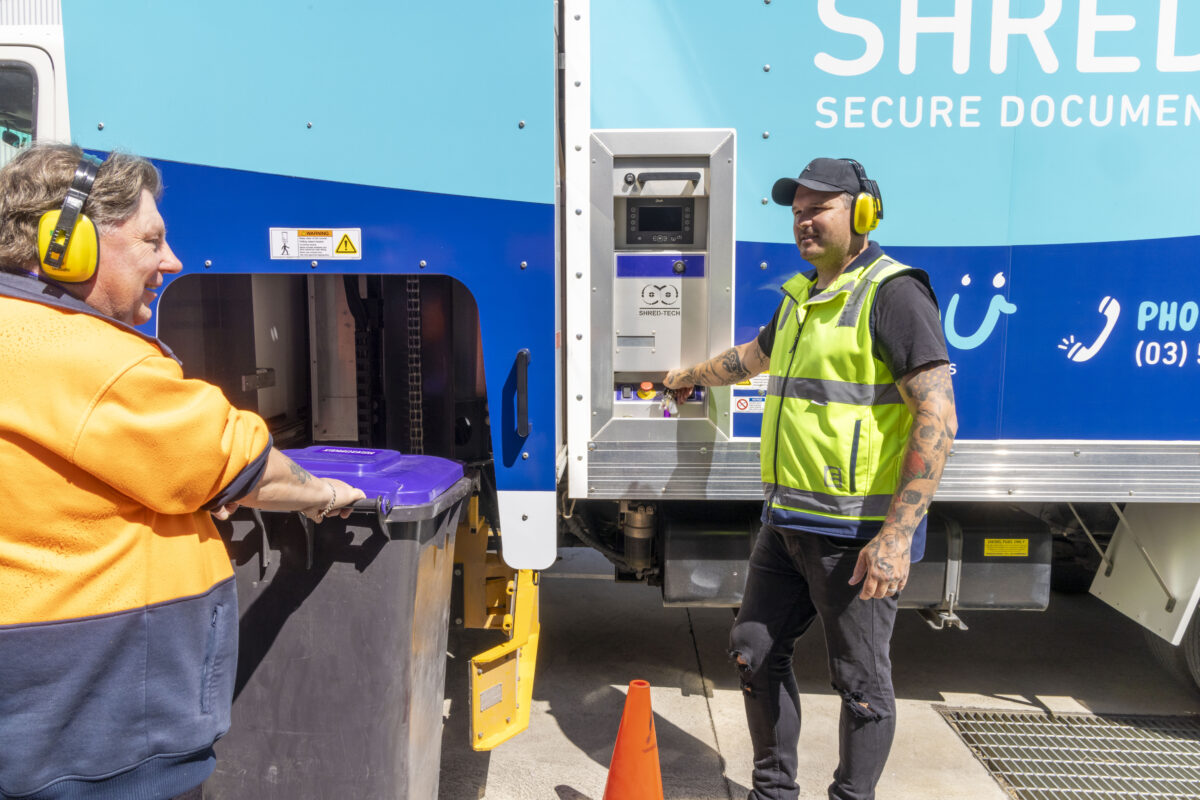


If you’re a business focused on doing good in your community, Discover how one of our wonderful social enterprises can help you streamline your operations.
Some of our social enterprise partners include:
Barwon Water
Bulla
Carbon Revolution
CaronLab
Ford
Marcus Oldham
Pholklore
Rip Curl
SprintFest
Truffleduck
Viva
Worksafe
______________________________________________________________________
About genU
genU is a national organisation delivering training, employment, senior services, child care and disability services across Australia. For more than 70 years, we’ve been helping build inclusive communities. With more than 3600 employees and volunteers across the country, our teams are united in our mission; to empower people to reach their full potential.
As a ‘profit-for-purpose’ organisation, genU reinvests its surpluses to deliver a diverse range of services to support people with disability, ageing Australians, students, and the unemployed. This means that every time you choose genU Business Enterprises for business and food services, you’ll be doing a world of good – not just for the employee with disability, but also for local residents accessing genU support.
References:
Australian Network on Disability (2023) Disability Statistics. Disability statistics – Australian Network on Disability (and.org.au)
Campbell, P., Wilson, E., Crosbie, J., & Eversole, R. (2022) Connecting Pathways to Employment with the Work Integration Social Enterprise (WISE) model, Centre for Social Impact, Swinburne University. https://doi.org/10.25916/pt29-tq18
genU (2020) WORKING LIVES People with disability share their experiences of finding, gaining and sustaining work. https://5744c5.hostroomcdn.com/wp-content/uploads/2021/03/Working-Lives_discussion-paper_FINAL-15-12-20.pdf

